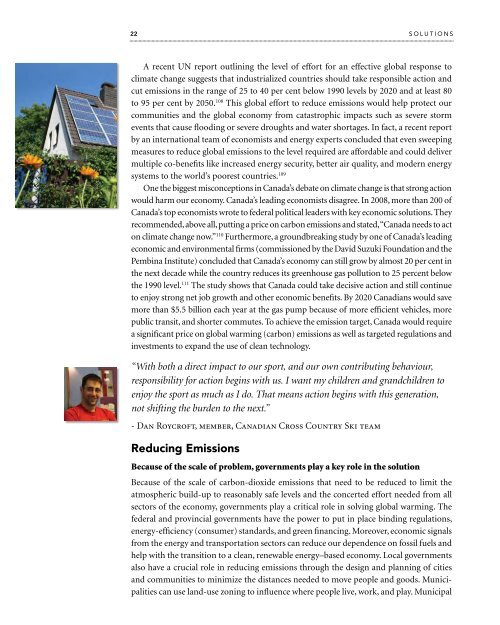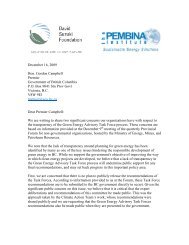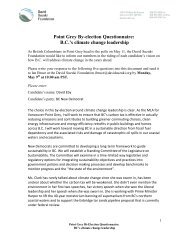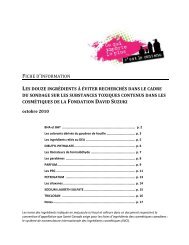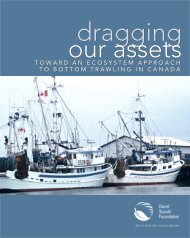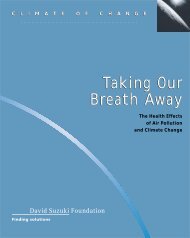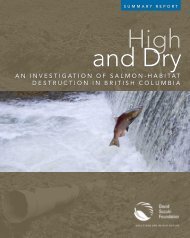On Thin Ice: Winter Sports and Climate Change - David Suzuki ...
On Thin Ice: Winter Sports and Climate Change - David Suzuki ...
On Thin Ice: Winter Sports and Climate Change - David Suzuki ...
You also want an ePaper? Increase the reach of your titles
YUMPU automatically turns print PDFs into web optimized ePapers that Google loves.
22 solutions<br />
A recent UN report outlining the level of effort for an effective global response to<br />
climate change suggests that industrialized countries should take responsible action <strong>and</strong><br />
cut emissions in the range of 25 to 40 per cent below 1990 levels by 2020 <strong>and</strong> at least 80<br />
to 95 per cent by 2050. 108 This global effort to reduce emissions would help protect our<br />
communities <strong>and</strong> the global economy from catastrophic impacts such as severe storm<br />
events that cause flooding or severe droughts <strong>and</strong> water shortages. In fact, a recent report<br />
by an international team of economists <strong>and</strong> energy experts concluded that even sweeping<br />
measures to reduce global emissions to the level required are affordable <strong>and</strong> could deliver<br />
multiple co-benefits like increased energy security, better air quality, <strong>and</strong> modern energy<br />
systems to the world’s poorest countries. 109<br />
<strong>On</strong>e the biggest misconceptions in Canada’s debate on climate change is that strong action<br />
would harm our economy. Canada’s leading economists disagree. In 2008, more than 200 of<br />
Canada’s top economists wrote to federal political leaders with key economic solutions. They<br />
recommended, above all, putting a price on carbon emissions <strong>and</strong> stated, “Canada needs to act<br />
on climate change now.” 110 Furthermore, a groundbreaking study by one of Canada’s leading<br />
economic <strong>and</strong> environmental firms (commissioned by the <strong>David</strong> <strong>Suzuki</strong> Foundation <strong>and</strong> the<br />
Pembina Institute) concluded that Canada’s economy can still grow by almost 20 per cent in<br />
the next decade while the country reduces its greenhouse gas pollution to 25 percent below<br />
the 1990 level. 111 The study shows that Canada could take decisive action <strong>and</strong> still continue<br />
to enjoy strong net job growth <strong>and</strong> other economic benefits. By 2020 Canadians would save<br />
more than $5.5 billion each year at the gas pump because of more efficient vehicles, more<br />
public transit, <strong>and</strong> shorter commutes. To achieve the emission target, Canada would require<br />
a significant price on global warming (carbon) emissions as well as targeted regulations <strong>and</strong><br />
investments to exp<strong>and</strong> the use of clean technology.<br />
“With both a direct impact to our sport, <strong>and</strong> our own contributing behaviour,<br />
responsibility for action begins with us. I want my children <strong>and</strong> gr<strong>and</strong>children to<br />
enjoy the sport as much as I do. That means action begins with this generation,<br />
not shifting the burden to the next.”<br />
- Dan Roycroft, member, Canadian Cross Country Ski team<br />
reducing Emissions<br />
Because of the scale of problem, governments play a key role in the solution<br />
Because of the scale of carbon-dioxide emissions that need to be reduced to limit the<br />
atmospheric build-up to reasonably safe levels <strong>and</strong> the concerted effort needed from all<br />
sectors of the economy, governments play a critical role in solving global warming. The<br />
federal <strong>and</strong> provincial governments have the power to put in place binding regulations,<br />
energy-efficiency (consumer) st<strong>and</strong>ards, <strong>and</strong> green financing. Moreover, economic signals<br />
from the energy <strong>and</strong> transportation sectors can reduce our dependence on fossil fuels <strong>and</strong><br />
help with the transition to a clean, renewable energy–based economy. Local governments<br />
also have a crucial role in reducing emissions through the design <strong>and</strong> planning of cities<br />
<strong>and</strong> communities to minimize the distances needed to move people <strong>and</strong> goods. Municipalities<br />
can use l<strong>and</strong>-use zoning to influence where people live, work, <strong>and</strong> play. Municipal


